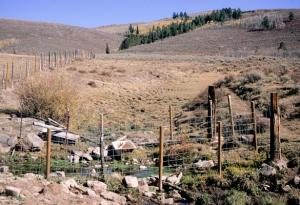
Livestock grazing negatively impacts more public lands in the West than any other industry. Photo George Wuerhner
Legislation that would have given the federal government authority to close grazing privileges on public lands was recently withdrawn.
Grazing permit buyouts allow the federal government to close public lands to future livestock grazing permanently.
New Mexico’s U.S. Senator Martin Heinrich introduced and sponsored the Wildlife-Livestock Conflict Resolution Act that would have applied only to New Mexico, but still has implications to national efforts to remove livestock from public lands. After significant pushback from the livestock community, Heinrich has decided to shelve the legislation for now.
Fortunately national permit retirement legislation, the VGPRA (Smith/Huffman) is still waiting for Congresional action.
Many see buyouts as a “win-win” for the rancher and the public. In exchange for a pre-determined amount of money, private foundations and individuals can pay a rancher to relinquish their grazing privileges to public land allotments voluntarily. At the same time, the federal government permanently closes the allotment to future grazing.

Domestic sheep were removed by grazing permit reirement in the a portion of the Upper Green River area of Wyoming seen here, but the Bridger Teton Nationa Forest wants to reopen the allotment to cattle grazing. Photo George Wuerthner
One of the benefits of federal legislation is that it makes any agreement permanent. Without permanence, federal agencies sometimes try to restock the allotments with livestock, as proposed for the Upper Green River area of Wyoming.
It’s important to note that grazing on public lands is a privilege. The federal government can close an allotment at any time for any reason. However, due to the political influence of the livestock industry, permanently retiring a grazing allotment is often tricky, even if a rancher agrees to relinquish their grazing privileges.

Legislation that created the Boulder White Cloud Wilderness areas in Idaho contained language for voluntary grazing permit retirement. Photo George Wuerthner
For instance, livestock permits in Idaho were retired as part of the legislation passed to establish the Boulder-White Cloud Wilderness. Similar retirement of grazing privileges successfully closed several allotments on Steens Mountain in Oregon with the passage of the Steens Mountain Cooperative Management and Protection Act.
There are many advantages to grazing permit retirement for the public. Livestock grazing has the biggest negative impact on public lands across the arid West. For more on these impacts, read my book Welfare Ranching.
Livestock grazing is one of the most significant factors in species endangerment in the West.

Wolves are regularly killed to appease ranchers grazing on public lands. Grazing permit retirement could reduce these conflicts. Photo George Wuerthner
It is the reason we are killing wolves, coyotes, and other native predators on public lands is to protect private livestock using public lands.
Grazing is also the number one factor in destroying the thin green lines of vegetation along waterways are crucial to 70-80% of the wildlife in the West.
Livestock grazing also spreads weeds by trampling biocrusts and consuming native grasses, giving exotic species like cheatgrass a competitive advantage.

Livestock manure is a major source of non-point pollution on public lands. Photo George Wuerthner
Livestock manure is also one of the significant sources of water pollution on much of the federal lands.
Livestock can also transmit diseases to wildlife, such as pneumonia, from domestic sheep to wild bighorns.
Removing livestock from wilderness areas and parks also increases the natural integrity of these areas. For instance, WildEarth Guardians had agreed to buy out Taos County rancher Erminio Martinez’s permit in the Columbine-Hondo Wilderness. However, without the permanence guaranteed by Heinrich’s legislation, the deal might not go through.
Unfortunately for Heinrich and U.S. citizens who own these public lands, opposition from the New Mexico Association of Conservation Districts, the New Mexico Farm and Livestock Bureau, and individual ranchers scuttled the bill.
Nevertheless, many individual ranchers see permit retirement buyouts as a way to sustain existing ranch operations. With money from a buyout, a rancher could purchase other private lands, pay off mortgages and other debt and otherwise realign their economic priorities.
Heinrich’s decision not to reintroduce his legislation is a significant loss to the public. Private domestic animals raised on public lands for private profit will continue to trash and degrade public lands and wildlife resources.

Cow hammered spring and riparian area in Idaho. Permit retirement could reduce such damage. Photo George Wuerthner
There is other legislation that includes grazing permit buyouts as part of the package. One is the Northern Rockies Ecosystem Protection Act, sponsored by the Alliance for Wild Rockies which would protect nearly 23 million acres.
You can help WildEarth Guardians persuade Senator Heinrich to reintroduce his legislation here.
Among the organizations promoting livestock grazing permit retirement are Western Watersheds Project, the Center for Biological Diversity, Gallatin Wildlife Association, Oregon Natural Desert Association, Alliance for Wild Rockies, Southern Utah Wilderness Alliance, Wilderness Watch, Great Old Broads For Wilderness, and the Sagebrush Habitat Conservation Fund. Supporting all these organizations can further the permit buyout option.